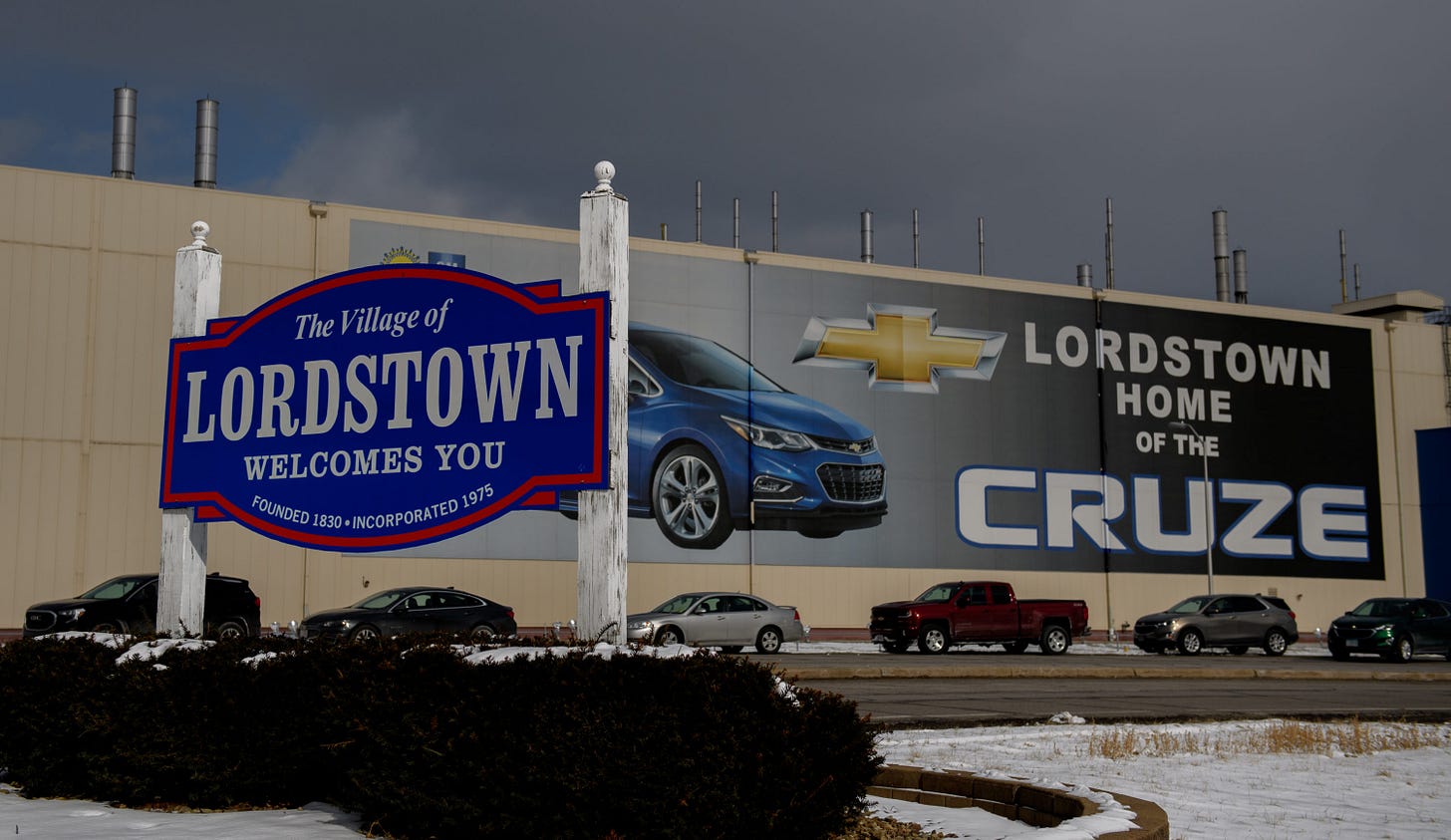How to Prevent the Next Lordstown
Nothing is inevitable about manufacturing losses.

General Motors first broke ground in Lordstown, Ohio, 55 years ago, and the factory was once considered the most modern GM plant in the country. Thanks to a combination of business decisions by the company, tariffs implemented by the Trump administration, and a general dearth of innovative thinking, the Lordstown Assembly is now set to close for good in January 2020.
From its first car, the Chevy Impala, to what now appears will be its last, the Chevy Cruze, the plant was known for its adaptability to ever-changing consumer demand. But with the announcement that GM is cutting 14,000 jobs across North America, including shuttering its Lordstown operations, adaptation has given way to extinction.
The ecological analogy is useful in more ways than one. The Trump administration’s tariffs on steel and aluminum have cost Ford and GM about $1 billion each. In any commercial ecosystem, when you raise the cost of inputs—a factory’s food source—the population declines.
Automakers, meanwhile, are looking ahead to trends in self-driving and electric vehicles. Yet rather than fostering that next stage in evolution, blunt trade restrictions and threats to revoke subsidies are the economic equivalent of wildlife conservation, treating the U.S. automotive sector as if it were an endangered species.
Public policy isn’t the only source of blame for the Lordstown closure, but it clearly hasn’t helped. Simply put, Washington, D.C., needs creative policies to encourage genuine economic development.
On the right, a laissez-faire ideology prefers to blame unions or even praise job losses as the efficient result of global competition rather than admit there might be a place for government. And on the left, the concerns of an urban and highly educated professional class have displaced the interests of blue collar workers. Both sides, in practice if not in theory, treat the decline of America’s manufacturing base as the inevitable price of progress.
Yet it doesn’t have to be this way. With the right framework, ordinary workers can benefit from change rather than suffer from it.
That’s the principle behind the Struggling Regions Initiative, launched this week by the Niskanen Center with the support of the Rockefeller Foundation. By exploring new models for supporting beleaguered economies in Ohio and throughout the country, the initiative aims both to avoid the ugly side of industrial policy and to identify policies that can actually work.
It’s not Washington’s responsibility to micromanage local economies or to pick winners and losers. Yet no one can deny that national policymaking has ripple effects throughout the country. The Struggling Regions Initiative is premised on identifying realistic ways—from trade agreements to the structure of the tax code—to strengthen and diversify America’s industrial economy, and in a way that promotes economic growth and dynamism.
Consider Germany. Even with high rates of unionization, the country remains dominant not just in automaking, but in manufacturing industries across the board. There are many reasons for this, from an early emphasis on vocational education to Germany’s unique banking system, that the U.S. can’t easily replicate. Nonetheless, there’s still much we can learn from countries that have preserved a robust working class. In particular, they show how smart investments can enable a country to climb the global value chain, to the benefit of both worker’s wages and broader measures of productivity.
Inspired by the German model, the historian Michael Lind has proposed the creation of a U.S. federally chartered development bank, with projects delivered through a decentralized system of mission-driven regional banks. Such banks would issue tax-favored bonds to finance projects, from infrastructure to commercializable R&D, posing minimal costs to taxpayers. We already use this model through the Federal Home Loan Bank System, but there are surely better things government-sponsored banks could subsidize than mortgages.
The Small Business Administration is likewise long overdue for an overhaul. The federal agency helps reduce lending and capital costs for low-risk, mainstreet businesses, when there’s no reason its programs couldn’t be reoriented to high value-added and tradable sectors. In short, we have many tools at our disposal for diversifying the U.S. economy that simply aren’t being used to their full effect, and which hold far more promise than doubling-down on a lose-lose trade war.
Perhaps the Lordstown Assembly cannot be saved. But focusing on particular companies, and particular plants, misses the forests for the trees. It’s best to focus on the broader policy frameworks that enable manufacturing and high productivity activities of all types to thrive, ensuring good paying jobs are created as fast as they’re destroyed.
When trade with China displaced upward of 1 million U.S. manufacturing jobs in the 2000s, the issue wasn’t primarily that factories shut down or moved abroad. The deeper problem was what replaced them. For the vast majority who weren’t rehired by a more productive factory, the choice between lower paying service sector work or becoming a software engineer was scarcely a choice at all.
GM, for its part, has announced that workers whose plants are being closed will be first in line for jobs elsewhere in its production line. Yet without rebalancing the U.S. economy away from lucrative, intangible sectors like IT and finance, and back toward more physical forms of creative destruction, opportunities for technically trained employees in working-class communities will continue to shrink.
In economics, they call that “specialization”—doing one thing really well. But in any ecosystem, natural or economic, it takes a diversity of life and work for the whole to succeed. These new layoffs, and yet another closure of a storied American manufacturer, are a blight that will spread without the resolve that nothing is truly inevitable.

